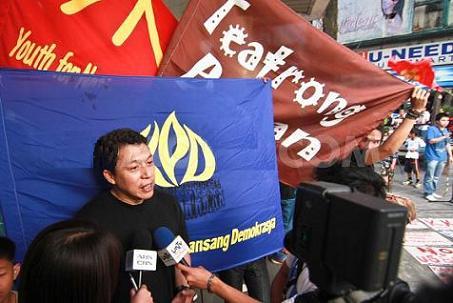

Communique of the 4th Congress of the Movement for National Democracy - Philippines
Wanneer: 16/12/2012 - 02:22
The Kilusan sa Pambansang Demokrasya (Movement for National Democracy) successfully held its Fourth National Congress in the City of Baguio on November 28-30, 2012 with the theme: Assiduously conduct political and organizational consolidation! Expose and Oppose Imperialism and Neocolonialism! Persevere in the Fight for National Democracy.

The former National Council decided on the theme bearing in mind that the policies of the present government in the Philippines, while appearing to improve governance and the fiscal situation of the country, cater primarily to the interests of foreign monopoly capitalists. The Aquino administration adheres in every respect to neoliberalism despite the glaring and apalling reality that this brought the capitalist world to the crisis that exploded in 2008, has not been remedied and is deepening.
One hundred and nineteen (119) delegates attended the congress. These delegates came from five regions of Luzon, Central Visayas and two regions of Mindanao. They represented the following sectors: workers, urban poor, farmers, women, youth, artists and teachers. A small number of lawyers and priests were also among the delegates.
The delegates marched from the grounds of the congress venue to the session hall as members of Teatrong Bayan, Galo Tepangan, and Teatro Linaaw sang the March of the Kilusan. This was followed by musical numbers and plays presented by the three cultural artists’ groups, after which, Chester Amparo, the Secretary General acknowledged and welcomed the delegates, observers and other participants.
Jose Eleuterio “Pete” Pinlac, chairperson of Kilusan opened the Fourth National Congress at 10:30am.
The Congress approved the agenda. The approval of the minutes of the Third National Congress followed.
Pinlac discussed the international and national situation and the challenges posed on the people’s movement.
Amparo read the report on the four-year work of the movement. Among the highlights are the following:
1. The number of regions covered increased, from eight to 10. The number of cities and towns covered also increased significantly;
2. The membership of our mass organizations increased by 60%. All areas contributed to this increase but the most significant of these is the National Capital Region (NCR) that has newly-opened areas through the efforts of the area formations;
3. Some area formations and sectoral organizations have opened new fields that are of significance. Among others, we have opened and developed favorable opportunities for the building and national line-industry unions. We have built a peasant alliance that could hasten the organizing work among peasants in Southern Luzon.
4. The Kilusan consistently waged campaigns that left an indelible mark in the people’s history of struggle. Among these are the campaigns against the VFA and US military presence, against the recommissioning of the Bataan Nuclear Power Plant, for the implementation of labor standards particularly in Hanjin and against wanton mining and for a rational mining policy.
5. The Kilusan initiated the building of alliances both in the national and local levels to broaden participation and advance the struggle on ceratin issues like the VFA, the Nuclear Plant, the coal plant in Mariveles, demolition of vendors’ stalls and the slave-like treatment of workers in Hanjin.
The Committee on Constitutional Ammendments presented the proposed ammendments to the organization’s Constitution. These were discussed and approved by the Congress. The two biggest ammendments are:
1. The shortened name of the organization will be changed from the letters KPD into Kilusan (Movement);
2. The National Congress willl be convened every five years instead of every three years.
The Fourth Congress divided itself into groups for the workshops that presented proposals for the five-year program. The five-year program centers on the following:
1. An education campaign on neoliberalism, the global capitalist crisis and the low-intensity democracy that the PNoy Aquino Administration is putting into operation in the country.
2. Information drive and actions to expose and oppose the PNoy presidency’s deception: in its stand regarding the US military presence especially in the plan to open Subic for US military use; in its Public-Private Partnership Scheme; in allowing the plunder of the country’s resources; in its paying a mere lip service to human rights; in its stand regarding contractualization and increasing unemployment; in its ‘hands off’ policy regarding wage hikes; in its inaction towards continually rising prises of basic commodities, utilities, health services and education; and, in its hollow development policy─extractive industries for the use of big business and for increased revenue collection and allowing casinos and similar establishments to complement enhanced tourism.
The Fourth Congress of the Kilusan elected a set of new national leaders that will serve for the next five years. Atty. Virginia Laxa-Suarez, the chairperson of KAISA KA, a women’s organization affiliated with the Kilusan, was elected secretary-general of the Kilusan. She will also be the national spokesperson of the Kilusan.
At three o’clock of Bonifacio Day 2012, the session hall of the Fourth National Congress reverberated with applause as all the delegates expressed support for the new leadership, eagerness to contribute to achieve the targets for the next five years and gladness for the indisputable success of the Congress.
Baguio City, Philippines
Tags: democracy human rights Philippines